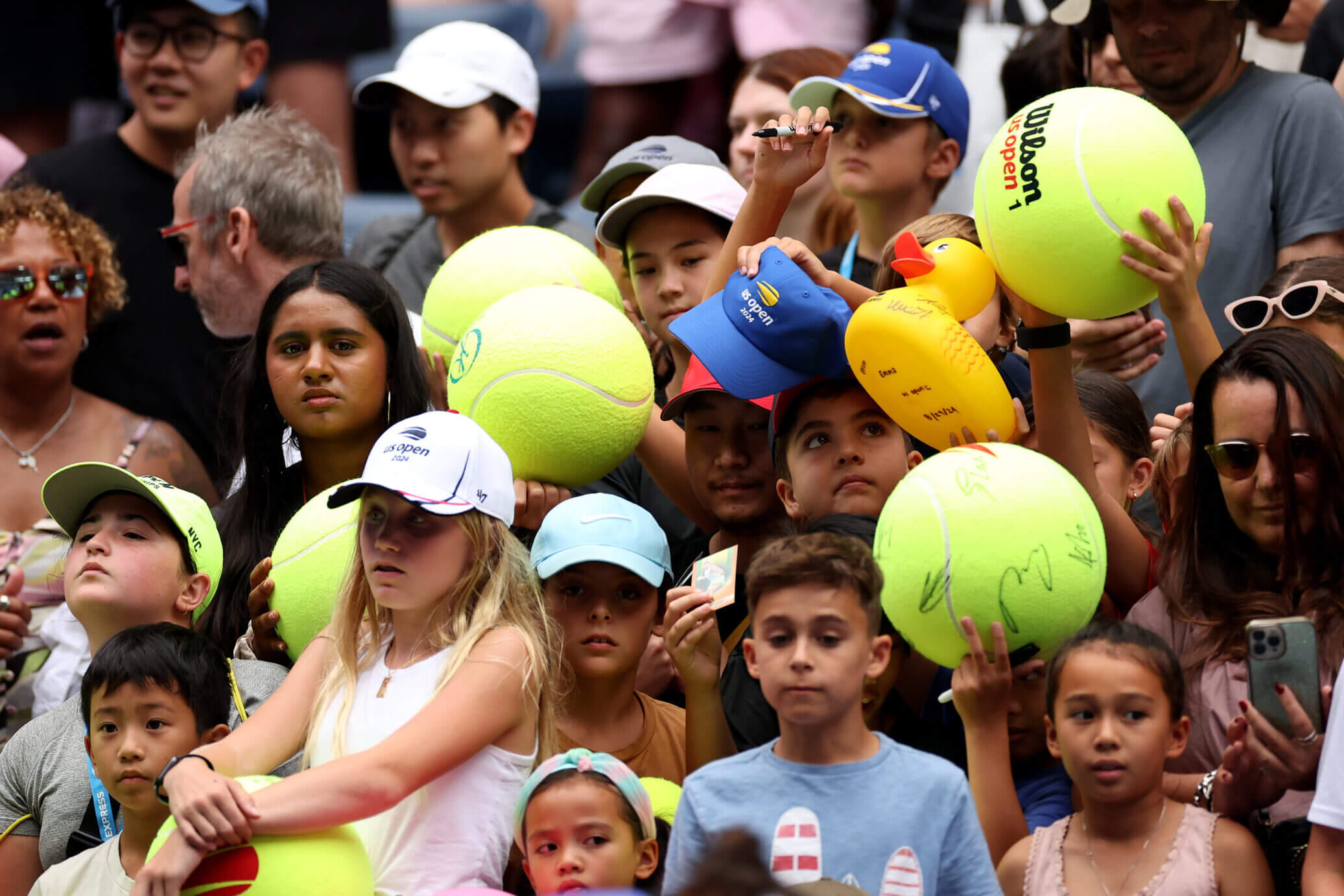Follow live coverage of day five at the 2024 US Open
FLUSHING, N.Y. — Against the blue and green of the Billie Jean King Tennis Center courts, the yellow ball careening between two rackets stands out.
That’s before you see the yellow balls up in the stands. They’re still, but they’re bigger.
Thursday morning on Court 7, a small but rapt crowd watched Diana Shnaider, the No. 18 seed from Russia who is having the kind of year that makes tennis fans take notice. She was taking apart the Dane, Clara Tauson, who in 2022 was roughly where Shnaider is now before a series of back and foot injuries stalled her progress.
At 2-4, 15-30, with Tauson serving, the judges in the seats to the side of the court, a little higher than the umpire’s chair, had seen enough.
“Two more rounds,” one said. “Then we can go down.”
They meant points, but it’s easy to make a mistake when you’re just a kid clutching the most sought-after piece of merchandise at the U.S. Open. A jumbo-sized tennis ball, 11 inches big and emblazoned with the Wilson logo just like the smaller ones getting blasted and feathered between the white lines, is as essential here as a water bottle and a hat. It’s a canvas for autographs from the protagonists, a souvenir of a day out. It has also turned into a fuzzy yellow harbinger of doom.

All manner of jumbo-sized tennis balls line the stands when matches finish (Kena Betancur / Getty Images)
Signing autographs after a match is one of the sacred obligations a tennis player commits to when they step onto a tournament court. Swerving fans is not the done thing, even if the loser is usually granted the grace of a quick exit, especially in matches of greater magnitude. For the winner, balls are reached out over gangways and notepads are dangled down from steep banks.
It doesn’t always go to script, as Novak Djokovic found out in painful fashion in Rome earlier this year. A keen spectator — not a kid, not clutching a ball — reached down to give the 24-time Grand Slam champion a high-five and instead inadvertently slipped a metal water bottle out of his rucksack and onto Djokovic’s head. Djokovic went for medical attention, lost his next match in disoriented fashion, and then went for concussion tests in Belgrade.

GO DEEPER
Djokovic wears bike helmet to Italian Open after being struck by water bottle
In New York, no such worries. Backpacks are banned, as crowd controllers loudly and regularly remind the fans walking down the boardwalk from Mets-Willets Point subway station.
The same fans surge forward at the call of “game, set and match”, no matter the occasion. Field court or stadium court, favorite player ever or one they didn’t know existed until taking a seat to watch them play for their tennis life, the ritual is the same. Ball under the arm. Permanent marker in hand. The conciliatory handing over of $50 (almost £38), and maybe some wheedling to an eventually obliging parent, happened earlier.

The balls are on display at Wilson’s brand shop, which also sells the balls used on the actual courts (Julia Nikhinson / Associated Press)
That ball, which costs $53.29 at the checkout at the Wilson shop, outmatching the $23 Honey Deuce cocktail as the canniest piece of inflation in Flushing, is made where the Wilson tennis balls on the courts are made. (The “extra duty” vs. “regular duty” debate between the men and women, which briefly went on hiatus in 2023 when both sides used the latter, is back for 2024.)
They look and feel like tennis balls, but they don’t bounce like them, enabling a happy and newly minted customer to dribble them like a basketball on the way to the court. The Wilson balls have the cachet, but any brand can put a logo on a tennis ball. The streetwear mega-brand, Kith, has made one in collaboration with Wilson in the past. It was $23 cheaper online when it dropped than the U.S. Open ball is on-site, but it will fetch three figures, second-hand and unblemished.
Ordinarily, the gathering of signatures takes place right at the end.
But this U.S. Open, busier than last year’s, which was at that time the busiest in history, requires some forward planning. There are more people and more oversized tennis balls, but the same number of players on the court. So look up at any scoreboard that suggests one of them is not long for the tournament, and you are likely to see a gaggle of giant tennis balls slowly bobbing down steps. Tennis might sometimes turn on a single point, but the kids aren’t interested in a comeback.
Lucia Bronzetti, the Italian who was an eyeful of clay from knocking Naomi Osaka out of the French Open, was in a bad spot Wednesday against Aryna Sabalenka. For most players, that bad spot is just being on a hard court with the Belarusian world No. 2, who is set to defend the Australian Open title for the second time in January. After her 6-3, 6-1 victory, she greeted a “mini-me” fan courtside, dressed in her outfit and carrying a little tiger toy.
“It’s such a motivation to keep going to inspire the young generation. That’s the main goal. Yeah, that was a very adorable moment,” Sabalenka said.

Aryna Sabalenka is greeted by the tennis balls after victory (Julia Nikhinson / Associated Press)
Young tennis fans clutching their souvenir, ready to meet their hero, is kind of cute too. Serving at 1-5 in the second set, Bronzetti more likely saw nothing but an eyeful of woven yellow, the Roman emperor’s thumbs down to her imminent defeat.
Out on Court 7, Tauson made them wait. A few pinging groundstrokes into the corners and Shnaider had to serve for the win. The match was on her racket, but the outcome was by no means certain. This was no deterrent to the deciders. “We can go down now,” another said at the changeover, hustling along the bleachers.
One young girl gave Tauson a chance, staying perched higher up, gripping the ball tight.
It wasn’t easy for Shnaider. After bringing up 30-0, Tauson leaned into a backhand to put her on her heels, before a double fault brought the game to 30-30. Still they waited.
By the time Shnaider was moving into the net at 40-30, the normal-sized tennis ball floating obligingly onto her racket ready to be put away, the big ones were behind her chair, in expectant hands.
(Top photo: Sarah Stier / Getty Images)





